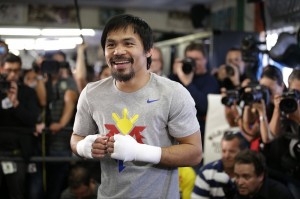MANILA, Philippines – Emmanuel “Manny” Pacquiao is idolized by tens of millions in the poverty-afflicted Philippines both for his punching power and as a national icon of hope after rising from the streets to the pinnacle of world boxing.
Known to his countrymen in the Asian archipelago as “The National Fist”, Pacman fights undefeated American Floyd Mayweather on May 2 to decide who is the world’s best “pound-for-pound” boxer.
To most of the Philippines’ population of almost 100 million, Pacquiao, winner of an unparalleled eight world championships in different weight divisions, is a well-loved national symbol, living proof that success is possible with hard work even if you are dirt-poor.
The reigning World Boxing Organization welterweight champion was the Philippines’ top taxpayer in 2013, and Fortune pegged him as the world’s 11th best-paid sportsman with 2014 earnings of $41.8 million.
He is now also elected member of the House of Representatives, a Christian preacher, an improbable professional basketball player and coach, and celebrity endorser for products ranging from karaoke microphones to pizzas, beer and cars.
Friends say the 36-year-old is generous to a fault, sharing his riches with friends as well as the downtrodden.
Some Filipinos see him as a future Philippine president, something that he admits he has considered. He will be eligible once he turns 40, when he is expected to have hung up his gloves.
A 1.70 meter (5ft 7in) southpaw, he began his professional ring career as a teenager, and in 20 years has compiled a 57-5-2 win-loss-draw record with 38 knockouts.
In the ring he is a volume power puncher who uses lightning footwork to create angles with which to deliver flurries, the likes of which have felled Oscar de la Hoya, Ricky Hatton, Miguel Cotto, Erik Morales and Marco Antonio Barrera.
From doughnuts to glory
The son of a deadbeat father, Pacquiao dropped out of high school at 14, sold doughnuts on the roadside and became a grocery stacker to help his mother support two younger siblings. He became a pro boxer at 17.
The sport bought him fame, power, influence and wealth, and with it the vices: booze, gambling, cockfighting and romantic links to beautiful film stars that at one point nearly wrecked his marriage.
But in 2012 he found religion and he sold his shares in a Manila casino, nightclub and bar, giving away the proceeds to employees. He also gave away his 1,000-plus fighting cocks to friends.
Nowadays he joins Bible-reading classes almost every day, often cites God as the source of his success. He used to wear a rosary around his neck before and after fights.
Despite his riches, Pacquiao remains a humble character with a common touch, complete with a thick accent that is usual with those born in the central and southern Philippines.
Last November Pacquiao announced he had apologized to neighbors and would sell his $9 million mansion in one of Manila’s swankiest areas after they complained about his visitors wearing shabby clothing.
“I may be as rich as some of them here, but my lifestyle remains the same and so is my heart. I am just a simple man. I will never change that,” he said.


